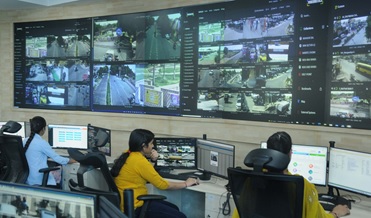A new hub for cyber security is to be opened in India. The Centre for Cyber Operations & Security (CenCOP) in Chandigarh will be equipped with live facial recognition, data analysis and predictive policing tools, and come with a price tag of 880 million Indian rupees, or about US$10.7 million.
The centre, which is the first of its kind in India, will tap into a CCTV network and scan for profiles that match an existing face biometrics database of wanted criminals. When the cameras spy a fugitive, an alert will go to the local police. The system will be based in Chandigarh, the capital of Punjab and Haryana states, but its capabilities will be available to law enforcement in neighbouring states.
The Indian government has also sought to deploy live facial recognition in public spaces in the Jammu and Kashmir region. Reports say that the centre will also collect and analyse data from social media and other sources for predictive policing. The report does not contain specific details on what kind of information will be gleaned from social media, nor what the other sources of data will be.
Chandigarh is the nodal centre for the Joint Cyber Crime Coordination Team, which is part of the larger Indian Cyber Crime Coordination Centre (I4C) scheme to address cybercrime in a coordinated manner. The city was an early adopter of biometric systems for institutional use. Cyber fraud is on the rise in India, and is a particular issue in Haryana state where a cyber fraud racket was busted recently.
After a discussion with experts from the Defence Research and Development Organisation (DRDO), the police and other stakeholders, the UT Administration prepared the final proposal for setting up the centre and submitted it to the MHA for approval.
A senior official has confirmed that the Ministry of Home Affairs (MHA) has accorded in-principle approval for the proposed centre, which was likely to be named the Centre for Cyber Security Operation (CenCOP). He said the final approval would be received only after getting funds sanctioned by the Finance Ministry.
The official said cyber security would be one of the main challenges in the coming years and they wanted to lead the way in the region in meeting the new-age challenges. Apart from research and analysis work, the centre would prepare strategies to deal with future challenges, he said, adding that the centre was most likely to be established within this year under the supervision of the UT police. It would be the first such centre in the region to deal with rising cases of online frauds, he added.
The official also said the anti-drone technology would also be part of the proposed centre. Over security threats and the possibility of misuse of drones by anti-social elements








